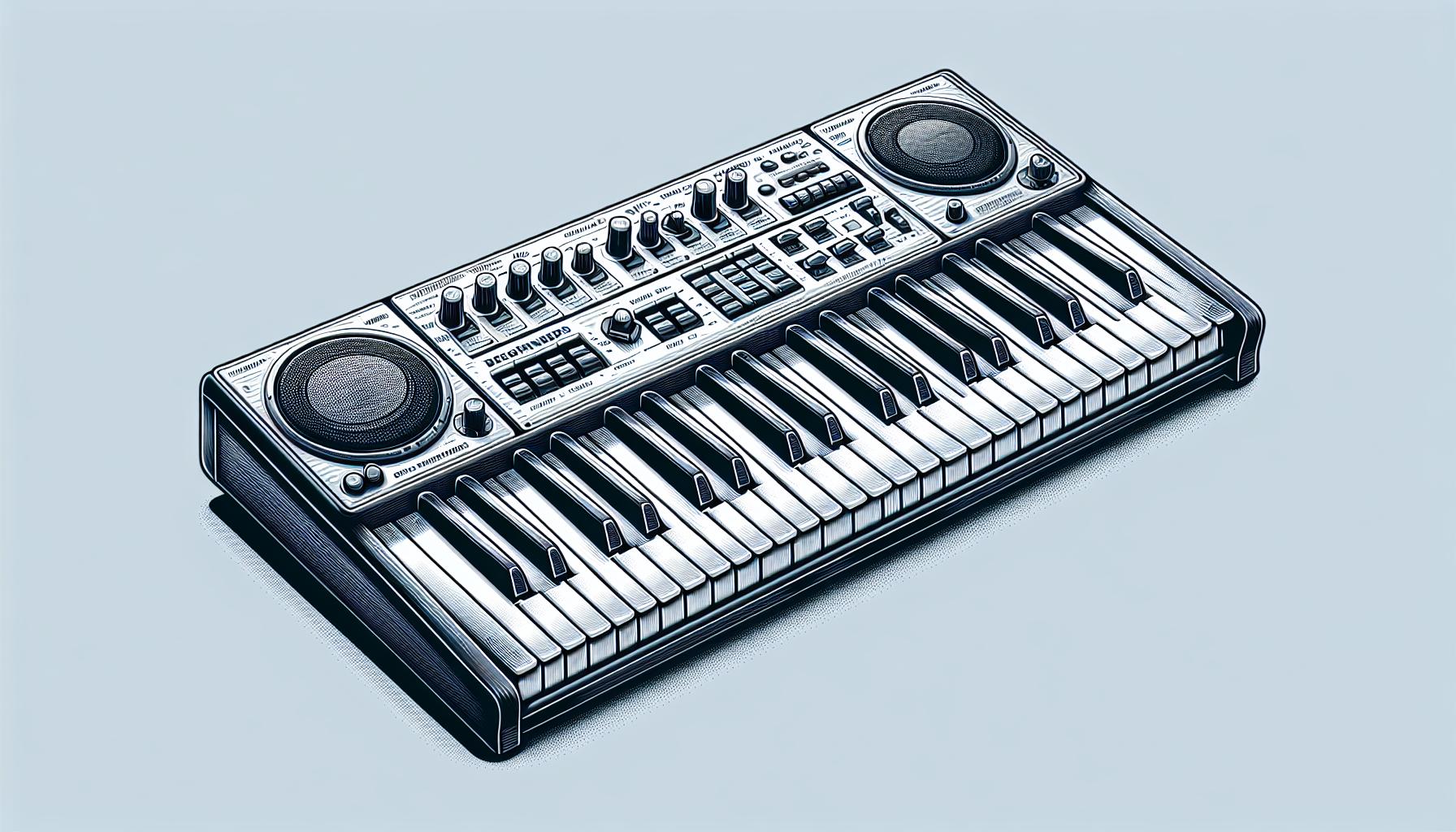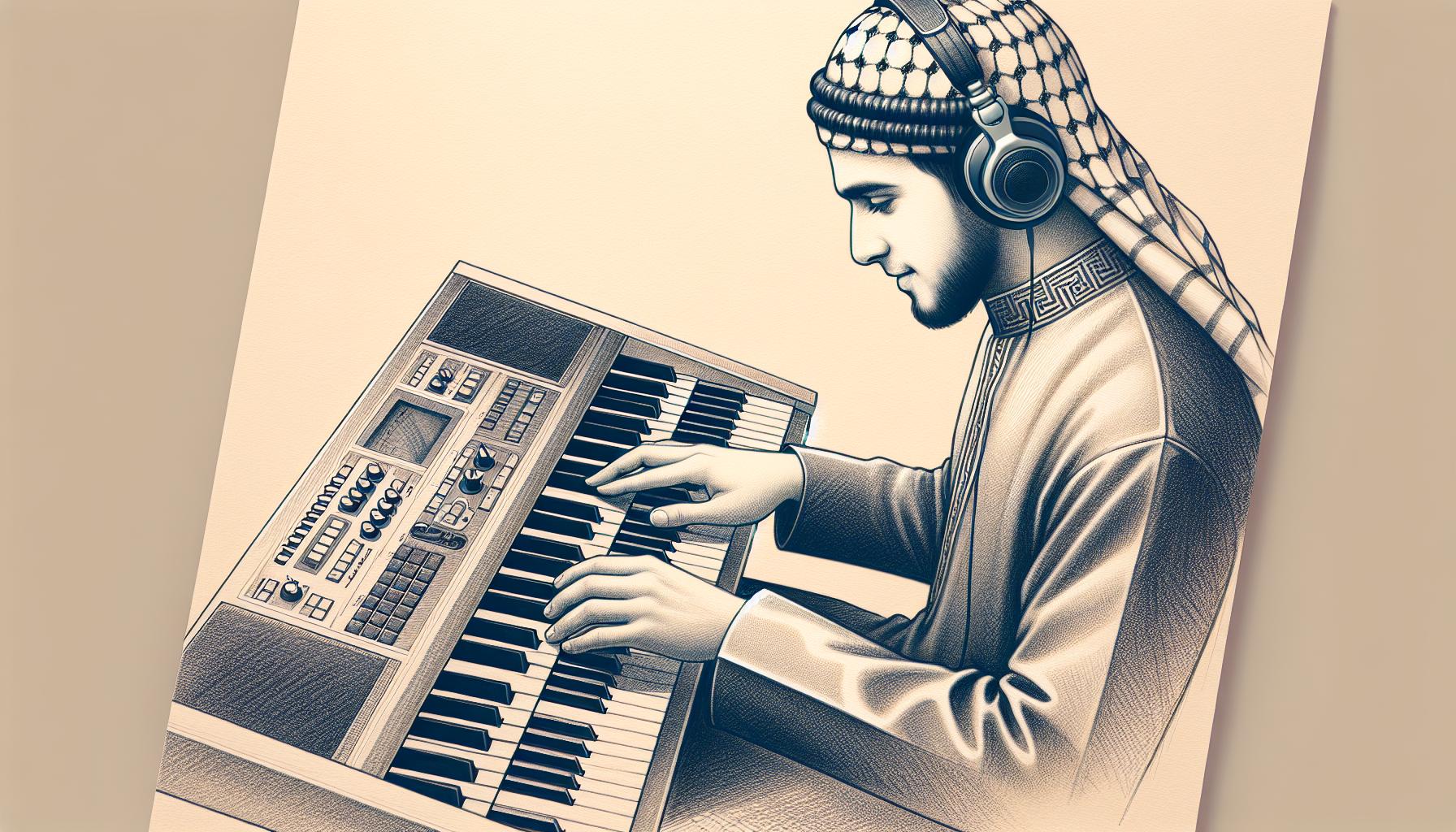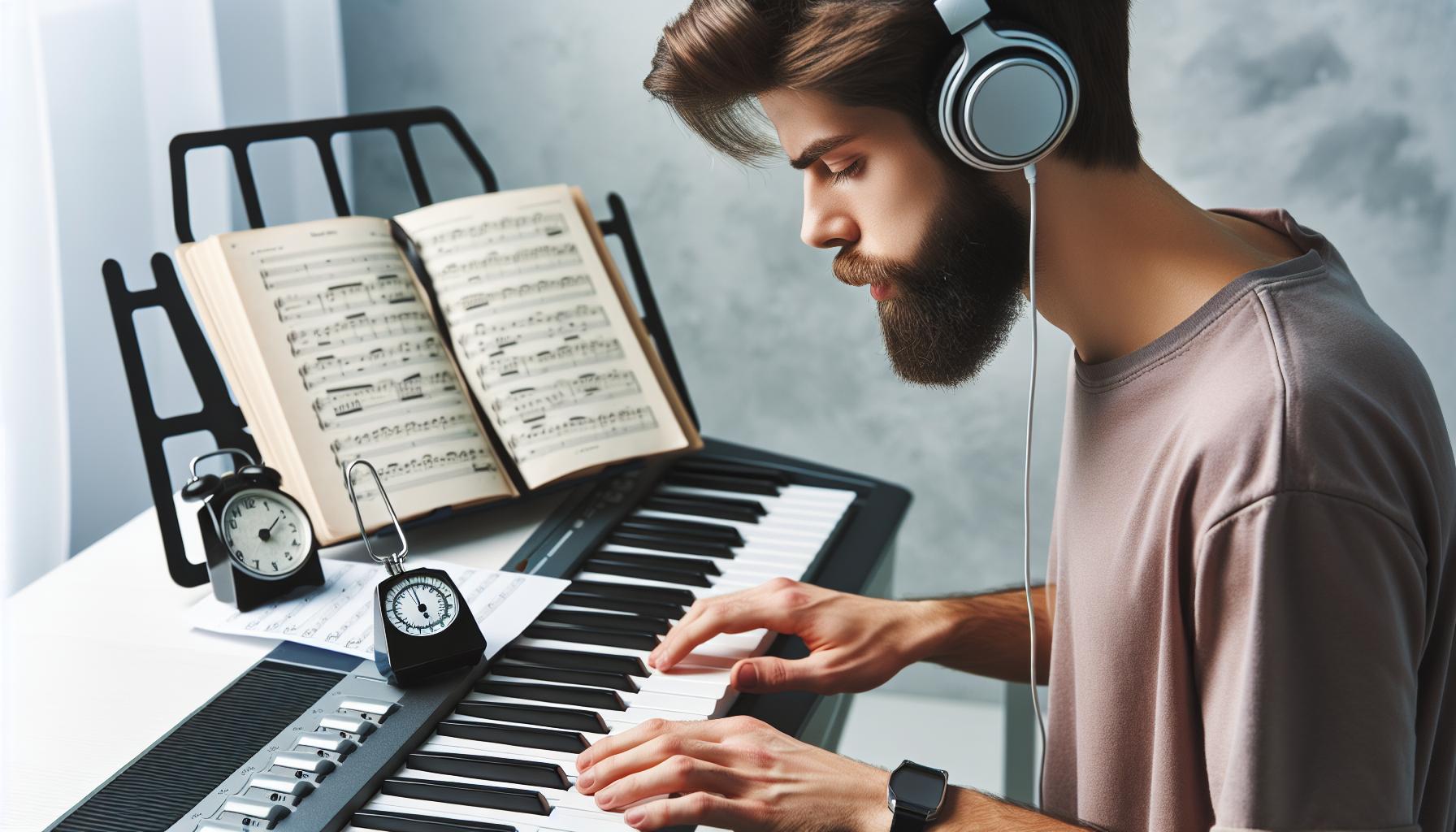In the world of music-making, finding the right tools can make all the difference, especially for beginners. One such essential tool is a keyboard, but not just any keyboard. For those starting out, a keyboard with a headphone jack offers the perfect blend of privacy and practice. It allows budding musicians to immerse themselves in their learning without worrying about disturbing others.
Choosing the best keyboard with a headphone jack can be a bit daunting with so many options out there. It's not just about the keys and sounds; it's about finding a keyboard that feels right, supports your learning journey, and fits your budget. Whether it's for a child taking their first musical steps or an adult rediscovering their love for music, the right keyboard can open up a world of possibilities.
Understanding the Importance of a Keyboard with Headphone Jack
When embarking on the exciting journey of learning to play the keyboard, beginners may not initially consider the significance of auxiliary features such as a headphone jack. Yet, this simple feature can profoundly impact both the learning experience and the overall enjoyment of playing the instrument. A keyboard with a headphone jack offers a level of privacy and flexibility that is invaluable for learners at any stage.
For one, it allows musicians to practice in shared spaces without disturbing others. Whether living in a crowded household or a thin-walled apartment, the ability to plug in headphones means practice sessions can continue late into the night or early in the morning, without any concerns about noise. This aspect of practicing with headphones encourages more frequent and potentially longer practice sessions, as learners won't feel pressured to stop due to external noise complaints.
Moreover, using headphones with a keyboard opens up a more intimate connection between the musician and their instrument. When headphones are used, every nuance of the sound becomes clearer. Beginners can better hear their mistakes and triumphs, which is essential for improvement. This clarity also extends to the use of built-in features many modern keyboards offer, such as metronomes, playback options, and different sound effects, allowing learners to explore and experiment freely.
The privacy afforded by headphones can also boost confidence. Beginners often feel self-conscious when starting out, worried about others judging their skills. A headphone jack eliminates this concern, providing a safe space where they can practice freely without fear of judgment. This psychological safety net can accelerate learning, as students are more likely to take risks, try new pieces, and push themselves beyond their comfort zones when they feel secure.
Choosing a keyboard with a headphone jack isn't just about the connectivity; it's about embracing a feature that supports the learning journey in multifaceted ways. It ensures that practice time is productive, exploratory, and tailored to the individual's pace and preferences. Beyond mere convenience, it's about creating an environment where learners can flourish, making it an essential consideration for beginners selecting their first or next instrument.
Factors to Consider When Choosing the Best Keyboard for Beginners

When embarking on the musical journey of learning to play the keyboard, beginners have a vast array of options to choose from. However, not all keyboards are created equal, especially for those just starting out. Selecting the right keyboard is crucial for a fulfilling learning experience. Here are several key factors that beginners should consider to ensure they make the best choice for their musical aspirations.
Key Size and Type
Beginners should look for keyboards with full-size keys to get used to the standard piano key size, making the transition to an acoustic piano smoother in the future if desired. Weighted or semi-weighted keys can also offer a more authentic piano feel, mimicking the resistance experienced when pressing down on piano keys. This feature is beneficial for developing proper finger technique and dynamics.
Number of Keys
Keyboards come in various sizes, typically ranging from 49 to 88 keys. Beginners might find a 61-key keyboard sufficient for starting out, as it provides enough range to play a wide variety of music without overwhelming the learner with too many keys. However, for those serious about their musical education, investing in an 88-key keyboard right from the start could be advantageous, as it covers the full range of a traditional piano.
Sound Quality
The quality of the sound produced by the keyboard is a vital consideration. A keyboard that closely replicates the sound of an acoustic piano will not only be more enjoyable to play but also more educational, as it gives the beginner a clear understanding of how their playing affects tone and expression. High-quality sound samples and built-in speakers are key factors in achieving a realistic sound experience.
Connectivity
In today's digital age, connectivity options such as USB and MIDI (Musical Instrument Digital Interface) ports can greatly enhance a keyboard's versatility. For beginners, a headphone jack is essential for private practice. Not only does it allow for undisturbed practice sessions, but it also connects the player more intimately with the music. Additional connectivity options for external speakers, smartphones, and computers can also offer opportunities for interactive learning experiences through music apps and software.
Top Picks of Keyboards with Headphone Jack for Beginners

When diving into the world of music through the keys of a keyboard, getting one that complements your learning phase is crucial. Especially for beginners, certain models stand out due to their features, user-friendly design, and, importantly, the presence of a headphone jack for those quiet practice sessions. Here's a look at a few keyboards that hit the right note for beginners.
Yamaha PSR-E363
The Yamaha PSR-E363 is a favorite among beginners for many reasons. It's not just its 61 touch-sensitive keys that offer a realistic feel, but also the impressive sound quality that makes practicing on this instrument a joy. With a built-in headphone jack, learners can immerse themselves in their music without disturbances. This model also boasts various learning features and a duo mode which splits the keyboard into two halves, allowing a teacher and student to play side by side.
- Key Features:
- 61 touch-sensitive keys
- Built-in lessons and duo mode
- USB to HOST connectivity
Casio CTK-2550
For those looking for an affordable yet feature-rich option, the Casio CTK-2550 stands out. It offers 61 keys, making it another excellent choice for beginners. The keyboard comes equipped with Casio's Step-up Lesson System, perfect for those starting their musical journey. With 400 sounds and 100 rhythms, learners have a vast library to explore and play along with. The headphone jack ensures that practice times are flexible, catering to private or late-night sessions without interrupting others.
- Key Features:
- 61 keys
- Step-up Lesson System
- 400 sounds and 100 rhythms
Alesis Recital 88-Key Digital Piano
For beginners ready to take their learning experience a step further, the Alesis Recital offers a full 88-key range, fostering the transition from beginner to intermediate levels. Its semi-weighted keys provide a tactile feel closer to that of an acoustic piano. The keyboard features adjustable touch response to match the player's style, making it highly versatile. Five built-in voices, including acoustic piano and strings, give learners a variety of sounds to explore. The headphone jack is, of course, a given, ensuring private practice can continue uninterrupted.
- Key Features:
- 88 semi-weighted keys
- Adjustable touch response
- **
Tips for Maximizing Your Practice Sessions with a Keyboard

Embarking on the journey of learning to play the keyboard can be an exciting yet challenging adventure. For beginners, owning a keyboard with a headphone jack isn't just about the convenience of practicing without disturbing others; it's also a gateway to enhancing the quality of practice sessions. Here are some invaluable tips to help beginners make the most out of their practice times.
Create a Consistent Practice Schedule
The first step to maximizing learning is establishing a regular practice routine. Consistency is key when it comes to mastering any new skill, including playing the keyboard. By setting aside a specific time each day dedicated to practice, learners can develop discipline and gradually improve their skills. It's not about the length of practice but the quality and consistency that counts.
Use the Right Accessories
To fully leverage a keyboard with a headphone jack, beginners should invest in a pair of high-quality headphones. These not only provide clearer and more detailed sound but also help in reducing distractions from the surrounding environment. Additionally, using a comfortable and adjustable bench will ensure proper posture throughout practice sessions, preventing any unnecessary strain or injury.
Leverage Built-in Features
Keyboards like the Yamaha PSR-E363, Casio CTK-2550, and Alesis Recital come equipped with a plethora of built-in features designed to enhance the learning experience. Beginners should take advantage of these tools:
- Touch-sensitive keys help in developing a feel for dynamics.
- Built-in lessons and exercises offer guided learning.
- A variety of sounds and rhythms can keep practice sessions engaging and fun.
Exploring and utilizing these features can significantly contribute to a more effective and enjoyable learning process.
Set Clear Objectives
Before each practice session, it's important to have a clear goal. Whether it's mastering a specific scale, learning a new piece, or improving timing, having a specific objective helps in maintaining focus and measuring progress. Beginners should start with small, achievable goals and gradually tackle more complex tasks as they advance.
Record and Review
Recording practice sessions is a powerful tool for self-assessment and improvement. By listening to their playbacks, beginners can identify areas that need work, such as timing, note accuracy, or expression. This immediate feedback loop accelerates the learning process, allowing learners to correct mistakes and refine their skills more efficiently.
Conclusion
Choosing the right keyboard with a headphone jack is a great first step for any beginner eager to embark on their musical journey. The Yamaha PSR-E363, Casio CTK-2550, and Alesis Recital stand out as top picks that offer both quality and value. But remember, it's not just about the instrument. Implementing the tips shared, like maintaining a consistent practice schedule and leveraging the keyboard's built-in features, will significantly enhance practice sessions. By setting clear goals and using recordings for self-assessment, beginners can progress more effectively. So grab those headphones, find a comfortable bench, and let the journey begin. Happy playing!
Harlan Kilstein began playing piano during covid with no piano background at all. He taught himself how to play learning what to do and what not to do.
Today he's an advanced intermediate player and can help you grow in your skills because he learned all this on his own.








